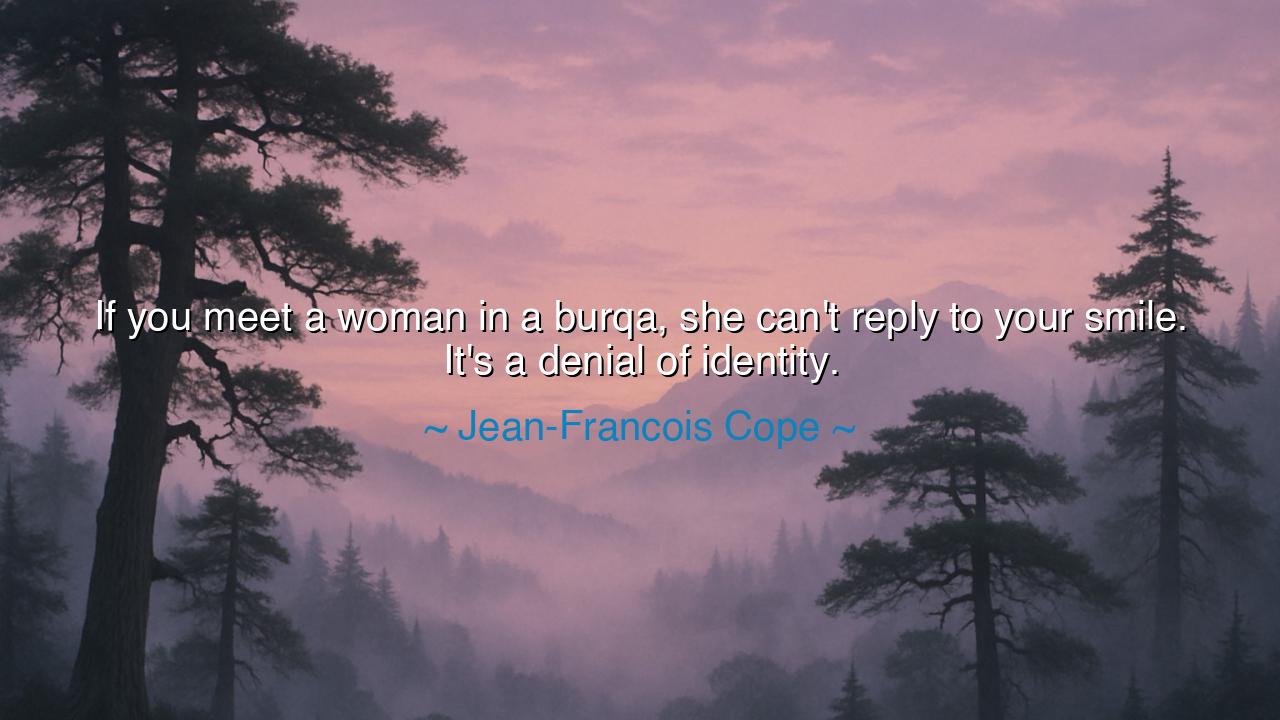
If you meet a woman in a burqa, she can't reply to your smile.
If you meet a woman in a burqa, she can't reply to your smile. It's a denial of identity.






The words of Jean-François Copé strike with the weight of controversy, yet they are born of an ancient yearning for recognition: “If you meet a woman in a burqa, she cannot reply to your smile. It is a denial of identity.” Here he speaks not merely of cloth, nor of custom, but of the human desire to be seen, to be acknowledged, to stand before another soul and say without words, “I exist, and I am here with you.” His statement reveals a belief that when the face is veiled, one of the most primal languages—the smile—is silenced, and thus the bond between two human beings is hindered.
To smile is no trivial gesture. Across all ages and all lands, it has been the simplest token of peace, the universal sign that one comes without harm. A smile crosses languages, dissolves suspicion, and awakens trust. It is the spark that bridges strangers, the gift that turns isolation into communion. If a veil hides this expression, Copé argues, then the natural flow of recognition between souls is blocked, and the woman herself becomes invisible, reduced not to her own essence but to a covered form, hidden in silence. Thus he calls it a denial of identity.
Yet this statement, though strong, does not arise in a vacuum. It emerges from the ancient debate between freedom of expression and the laws of society. In many lands, rulers have argued whether the veil is a symbol of faith and dignity or a barrier to unity and openness. In France, the land of Copé, the question became entangled with national ideals of equality, secularism, and visibility. His words are less a judgment of faith than a cry for transparency: he longs for the shared smile, the visible exchange of humanity that builds trust in the public square.
History shows us the power of the unveiled face. In the marketplaces of Athens, citizens met one another with open visages, believing that democracy itself required visibility, for to be unseen was to be voiceless. In the courts of kings, the ability to see another’s countenance was the measure of truth, for the eyes and the smile betray what the tongue might conceal. Yet history also shows us that veils, masks, and coverings have carried sacred meaning for countless peoples, symbolizing mystery, devotion, and protection. Thus the veil can be either a prison or a crown, depending on who places it and why.
Consider, for example, the Japanese Noh theatre, where actors wear masks that hide expression, yet paradoxically invite the audience to search more deeply into the spirit beneath. The mask does not destroy identity, but transforms it into something symbolic. Likewise, for some women the burqa is not denial but devotion, not erasure but declaration of faith. And so we see that the truth is not simple: a veil can conceal, but it can also proclaim. The challenge lies in discerning which it is in each life, in each story.
The lesson, then, is that human beings crave connection, and the smile is one of its purest forms. But connection cannot be forced; it must be chosen, both by the one who shows the face and by the one who beholds it. If a veil stands in the way, we must ask—does it silence the woman, or does it speak her belief? If it silences, then it is as Copé warns, a denial of identity. If it speaks, then it is not a prison but a banner of her will.
Therefore, let us walk wisely. Seek the smile wherever it can be found, whether upon the uncovered face or within the shining eyes behind a veil. Honor the dignity of the individual, but also guard the sacred bridge of recognition between souls. If you are free, do not hide yourself in fear; if you cover yourself, let it be from strength, not coercion. And when you meet another, whether veiled or unveiled, remember that the deepest identity cannot be destroyed by cloth, for it is written not only upon the face, but upon the heart.
Thus Copé’s words become more than a political cry; they remind us of a truth both ancient and enduring—that the human need to be seen, to exchange a smile, and to affirm one another’s identity is as essential to our nature as breath itself. The call is not only for visibility, but for understanding, so that every soul may live both in dignity and in connection with others.






AAdministratorAdministrator
Welcome, honored guests. Please leave a comment, we will respond soon